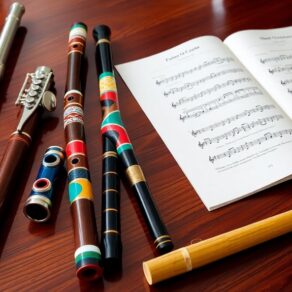When you compare melodies, flute music stands out as a true catalyst for creativity. Its soothing sounds evoke deep emotional responses, making it an excellent backdrop for concentration and flow. Classic compositions, like Bach's Baroque sonatas, showcase lyrical beauty, while contemporary innovations, including electronic effects, expand soundscapes. These inspiring tunes not only enhance focus but can spark improvisation and unique interpretations. By exploring various styles and personalizing your flute experience, you'll discover new insights that might transform your creative process. Stick around, and you might uncover more ways to harness the power of melody for your artistic journey.
Key Takeaways
- Flute melodies stimulate creative expression by providing a soothing backdrop that encourages free thought and imagination.
- Exposure to various flute compositions enriches musical vocabulary, leading to unique interpretations and innovative ideas.
- Engaging in flute meditation enhances focus, allowing for deeper creative exploration and minimizing distractions.
- Incorporating extended techniques in flute playing fosters emotional communication, inspiring fresh perspectives in composition.
- Collaborative playing within a community offers diverse insights that can ignite new creative pathways and ideas.
The Power of Flute Music

The flute's ethereal melodies possess a unique ability to transport listeners into domains of creativity and introspection. With roots tracing back thousands of years, flute history reveals this instrument's journey through cultures across the globe. From ancient civilizations to modern orchestras, the flute has played a pivotal role in expressing human emotion and connecting communities.
As you listen, you might find that these delicate notes evoke a sense of belonging, reminding you of shared experiences and collective memories.
The cultural significance of the flute extends beyond mere entertainment; it embodies the spirit of various traditions. In many indigenous cultures, the flute serves as a conduit for storytelling and spiritual expression. You may feel a deep resonance when hearing melodies that have been passed down through generations, as they carry the weight of history and the essence of a community's identity. The flute's association with spirituality and rituals highlights its enduring presence in diverse cultural practices.
This connection can spark your own creative thoughts, inviting you to explore your inner landscape.
Moreover, the flute's versatility allows it to blend seamlessly with different musical styles, from classical compositions to folk tunes. Each variation brings a fresh perspective, enhancing your understanding of the instrument's impact on artistic expression.
As you immerse yourself in these sounds, you'll discover how the flute not only captures emotions but also encourages you to tap into your own creativity. Embrace the power of flute music, and allow it to inspire your journey toward artistic fulfillment.
Classic Flute Compositions
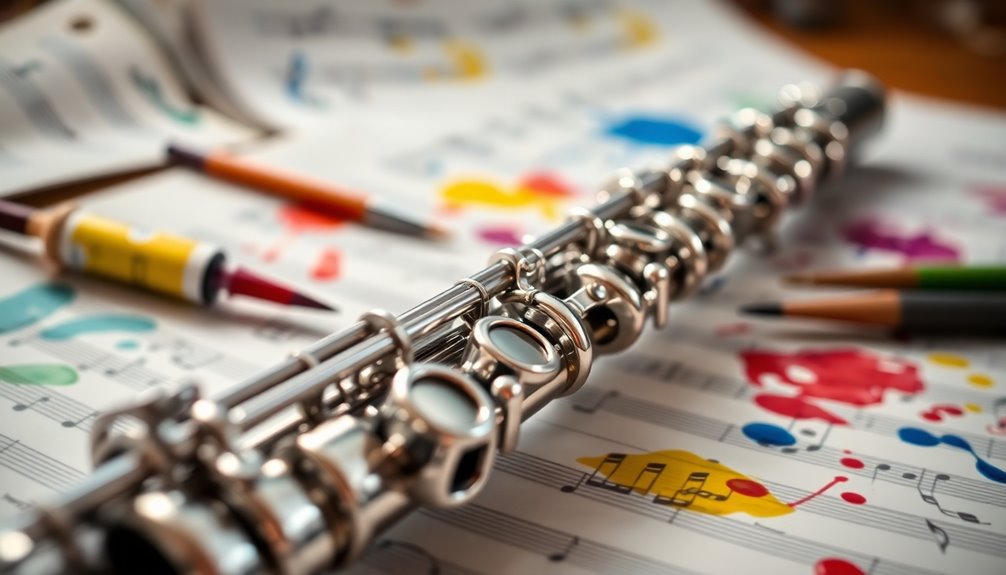
Numerous classic flute compositions have left an indelible mark on the world of music, showcasing the instrument's expressive potential. If you investigate the rich repertoire, you'll find that Baroque sonatas exemplify the flute's lyrical beauty.
Think of composers like Johann Sebastian Bach, whose sonatas intricately weave melodies that dance through time. The interplay between the flute and continuo creates an intimate conversation, inviting you to immerse yourself in the elegance of the era. Each note resonates with the spirit of Baroque artistry, making it a profound experience for any listener or player.
Transitioning to the Romantic period, the flute takes on a more dramatic role in concertos by composers such as Carl Reinecke and Jacques Ibert. These Romantic concertos expand the flute's expressive range, allowing for a more profound emotional depth.
You'll notice how the soaring melodies evoke passion and longing, wrapping you in a lush soundscape that feels both personal and universal. The virtuosic passages challenge the performer, creating a sense of connection as you navigate the complexities of the music.
Exploring these classic compositions not only enriches your understanding of the flute but also fosters a sense of belonging within a rich tradition. Additionally, the incorporation of extended techniques in modern compositions highlights the flute's evolving role in contemporary music.
Whether you play or simply listen, these works invite you to partake in a timeless dialogue that celebrates the beauty and versatility of the flute. With each performance, you're contributing to a legacy that continues to inspire creativity and connection among musicians and audiences alike.
Contemporary Flute Innovations
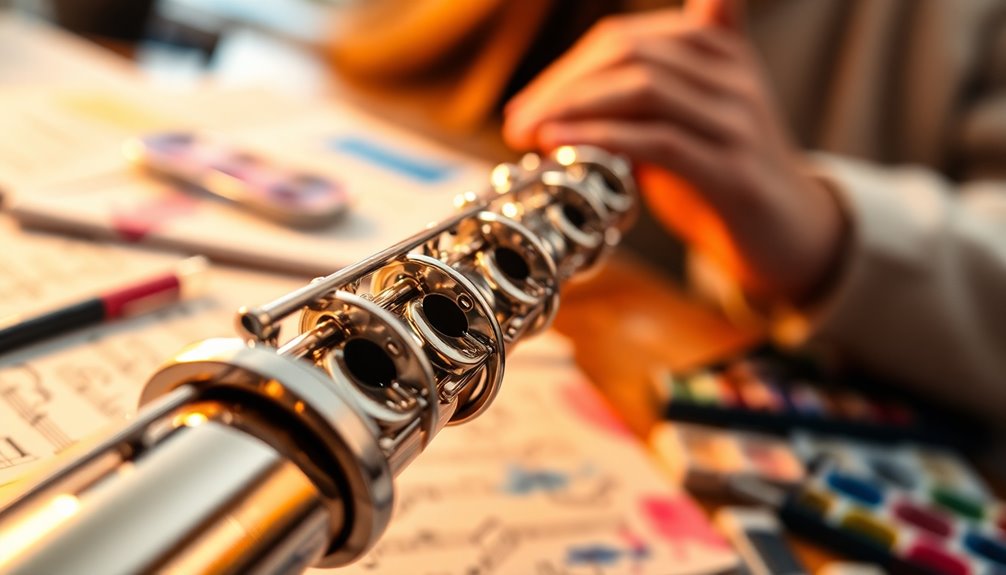
Embracing new technologies and diverse musical styles, contemporary flute innovations redefine the instrument's role in modern music. You'll find that today's flutists are pushing boundaries, employing advanced flute technology and exploring modern techniques that bring fresh energy to their performances.
The integration of electronic effects, like looping and effects pedals, allows musicians to create rich soundscapes, layering melodies in ways that were previously unimaginable.
Moreover, contemporary composers are experimenting with extended techniques—think breath sounds, multiphonics, and flutter-tonguing—which elevate traditional flute playing into a new sphere of expression. These innovations invite you to expand your understanding of the flute, transforming it from a classical staple into a versatile tool for contemporary genres such as jazz, pop, and even electronic music.
As you explore the world of contemporary flute innovations, you'll notice how flutists aren't just musicians; they're creators and collaborators. They often fuse genres, working alongside artists from various disciplines to produce uniquely engaging performances.
This spirit of experimentation cultivates a sense of belonging within a community that values creativity and exploration. Additionally, the mastery of advanced flute techniques fosters emotional communication, allowing flutists to convey deeper meaning in their performances.
In a world where musical boundaries are increasingly blurred, embracing contemporary flute innovations means you're part of a vibrant conversation. It encourages you to explore, innovate, and ultimately, express yourself in ways that resonate deeply.
Flute Music for Focus
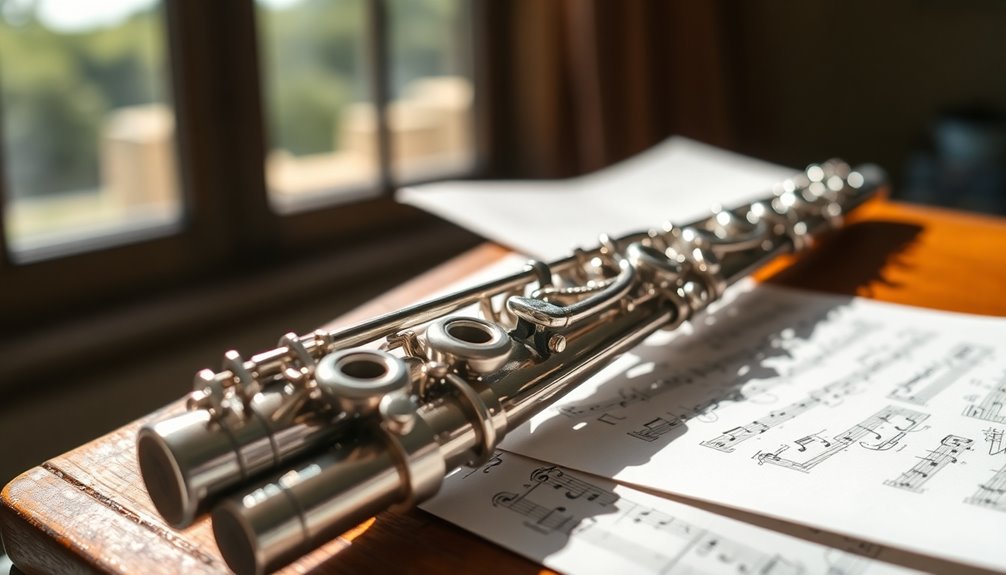
Flute melodies can create an atmosphere conducive to concentration and creativity, making them ideal for enhancing focus. When you immerse yourself in the soothing sounds of flute music, you engage in a form of flute meditation that calms the mind and sharpens your awareness. This practice not only fosters a sense of belonging to a larger experience but also enhances your productivity through effective focus techniques.
The gentle, airy tones of the flute can help you drift into a state of flow, where distractions fade away and your creativity can flourish. Whether you're studying, working on a project, or simply seeking a moment of tranquility, incorporating flute music into your routine can be transformative. Below is a table outlining some effective ways to utilize flute melodies for improved focus:
| Focus Technique | Description | Recommended Flute Piece |
|---|---|---|
| Deep Breathing | Pairing breath with music to center your thoughts | "Meditation from Thaïs" |
| Ambient Listening | Setting a soft background atmosphere during tasks | "Gymnopédies No. 1" |
| Guided Visualization | Using melodies to inspire imagery in your mind | "Carmen Fantasy" |
| Structured Breaks | Taking breaks with flute music to refresh focus | "Syrinx" |
Personalizing Your Flute Experience
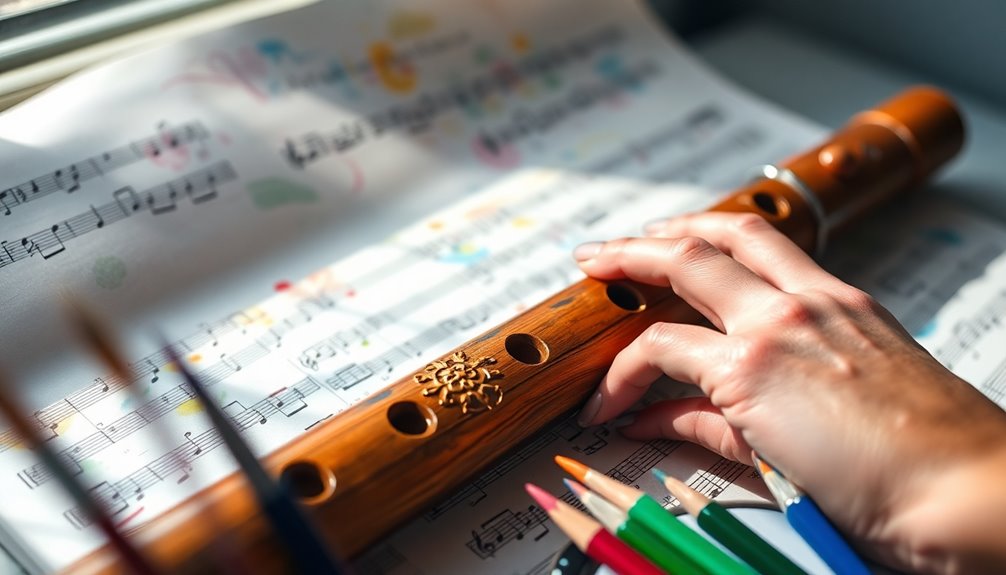
Enhancing your flute experience involves tailoring it to your unique preferences and creative needs. By making your flute experience personal, you can connect deeply with your instrument and express your individuality through music.
Here are some key elements to reflect upon:
- Choose a Custom Flute: Invest in a flute that resonates with your style. A custom flute can provide a unique sound that reflects your artistic vision.
- Experiment with Reeds: The type of reed you use can dramatically affect your tone. Try different materials and thicknesses to find the one that feels just right.
- Explore Different Genres: Don't limit yourself to one genre. Explore classical, jazz, or contemporary styles to inspire and broaden your musical palette.
- Incorporate Technology: Use apps and software to record and analyze your playing. This can help you understand your sound better and make informed adjustments.
- Join a Community: Find like-minded musicians who share your passion for flute playing. Engaging with a community can provide support, inspiration, and new ideas.
- Consider Brand Reputation: Selecting a flute from reputable brands like Yamaha or Gemeinhardt can ensure quality and ease of play, enhancing your overall learning experience.
Frequently Asked Questions
How Can I Learn to Play the Flute Effectively?
To learn to play the flute effectively, you need to focus on essential flute techniques.
Start by establishing a consistent practice routine; daily short sessions yield better results than infrequent long ones. Break down challenging pieces into smaller segments, mastering each before moving on.
Don't forget to listen to recordings of skilled flutists to inspire your sound. Engage with fellow musicians for feedback and support, creating a sense of belonging in your musical journey.
What Are the Health Benefits of Playing the Flute?
Playing the flute can be like a gentle breeze soothing your mind. It enhances your breath control, allowing you to improve lung capacity and promote relaxation.
As you master the instrument, you'll notice a boost in mental focus, sharpening your concentration skills. This combination not only reduces stress but also fosters a sense of belonging to a musical community.
Embracing these health benefits can enrich your life and connect you to others who share your passion.
Can Flute Music Improve My Mood?
Yes, flute music can definitely improve your mood.
Engaging in flute therapy allows you to express emotions in a creative way, fostering a sense of connection and belonging.
As you listen to or play soothing melodies, you may find your stress levels drop and your spirits lift.
The gentle tones of the flute can evoke feelings of tranquility and joy, helping you navigate life's challenges with a more positive outlook.
How Do I Choose the Right Flute for Beginners?
Choosing the right flute's like finding the perfect partner for a dance—each type has its own rhythm.
For beginners, consider student flutes with a closed hole, as they're easier to play. Look for brands known for quality, and don't forget to check for a good warranty.
Beginner tips include trying different sizes and materials. Ultimately, find one that feels comfortable in your hands, making your musical journey a joyful experience.
What Genres Complement Flute Music for Creativity?
When you're exploring genres that complement flute music for creativity, consider jazz fusion and classical crossover.
Jazz fusion brings a vibrant, improvisational flair, allowing you to experiment with rhythm and harmony.
On the other hand, classical crossover merges traditional sounds with contemporary elements, enhancing emotional depth.
Both genres invite you to connect with diverse musical communities, encouraging collaboration and innovation.
Embrace these styles, and you'll find your flute playing takes on new, exciting dimensions.
Conclusion
In the dance between classic and contemporary, flute music unfolds like a vibrant tapestry of sound. The haunting whispers of timeless compositions contrast beautifully with bold, innovative creations, igniting your creativity. As you explore these melodies, notice how they can sharpen your focus or elevate your spirit. By personalizing your flute experience, you weave your own narrative, blending the old and the new. Embrace the power of these tunes, and let them inspire your artistic journey.


